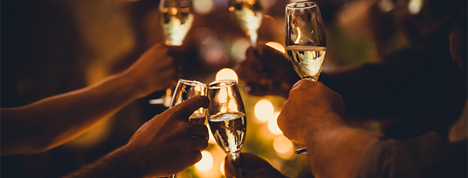Celebrate The Holidays — Carefully
December 15, 2021
‘Tis the season — for holiday parties! With the holiday season upon us, everyone should be aware that the host has specific responsibilities to keep everyone safe when alcohol is served. “Social host liability” laws refer to party hosts being legally responsible for the ensuing actions of intoxicated guests. In 43 states, hosts of a party can be held legally responsible for the personal injuries and property damage caused by overserved guests. In some cases, the party host can also face criminal charges. While states vary on how they approach social host liability, one of these three broad categories applies:
- Silent: no laws addressing social host liability
- Hosts Not Liable: with laws that specify social hosts are not liable
- Hosts Are Liable: with laws that specify the circumstances when a social host is liable
Laws Holding Hosts Liable
While the precise circumstances that determine when hosts are liable vary, New Jersey law allows the victim of a DUI accident to sue and recover damages from a social host when:
- Circumstances indicated that serving the guest alcohol created an “unreasonable risk of foreseeable harm.”
- The host provided alcohol to a “visibly intoxicated” guest.
- The host failed to take reasonable measures to prevent the guest from driving (i.e., offered alternative transportation).
Being a Responsible Host
If you plan to serve alcohol at any party, it is important to take steps to limit your personal liability as a host and make sure you are covered with the proper insurance. Before planning a party in your home, it is important to speak with your insurance agent about your homeowners coverage and any exclusions, conditions, or limitations your policy might have for this kind of risk. Homeowners insurance usually provides liability coverage for personal injuries or property damage claims, though coverage is typically limited and may be insufficient. To protect yourself and your guests, the Insurance Information Institute offers these suggestions to promote safe alcohol consumption and reduce your social host liability exposure:
- Understand your state laws.
- Consider venues other than your home.
- Hire a professional bartender who is trained to recognize signs of intoxication and can better limit consumption by partygoers.
- Promote designated driving. Encourage guests to choose a designated driver who can drive other guests home.
- As the host or hostess, be attentive so you can gauge your guests’ sobriety.
- Offer non-alcoholic beverages and always serve food.
- Don’t rush to refill their glasses when they are empty, and never serve alcohol to guests who are visibly intoxicated.
- If guests drink too much or seem too tired to drive home, call a cab, arrange a ride with a sober guest or have them sleep at your home.
‘Tis the season — for holiday parties! With the holiday season upon us, everyone should be aware that the host has specific responsibilities to keep everyone safe when alcohol is served. “Social host liability” laws refer to party hosts being legally responsible for the ensuing actions of intoxicated guests. In 43 states, hosts of a party can be held legally responsible for the personal injuries and property damage caused by overserved guests. In some cases, the party host can also face criminal charges. While states vary on how they approach social host liability, one of these three broad categories applies:
- Silent: no laws addressing social host liability
- Hosts Not Liable: with laws that specify social hosts are not liable
- Hosts Are Liable: with laws that specify the circumstances when a social host is liable
Laws Holding Hosts Liable
While the precise circumstances that determine when hosts are liable vary, New Jersey law allows the victim of a DUI accident to sue and recover damages from a social host when:
- Circumstances indicated that serving the guest alcohol created an “unreasonable risk of foreseeable harm.”
- The host provided alcohol to a “visibly intoxicated” guest.
- The host failed to take reasonable measures to prevent the guest from driving (i.e., offered alternative transportation).
Being a Responsible Host
If you plan to serve alcohol at any party, it is important to take steps to limit your personal liability as a host and make sure you are covered with the proper insurance. Before planning a party in your home, it is important to speak with your insurance agent about your homeowners coverage and any exclusions, conditions, or limitations your policy might have for this kind of risk. Homeowners insurance usually provides liability coverage for personal injuries or property damage claims, though coverage is typically limited and may be insufficient. To protect yourself and your guests, the Insurance Information Institute offers these suggestions to promote safe alcohol consumption and reduce your social host liability exposure:
- Understand your state laws.
- Consider venues other than your home.
- Hire a professional bartender who is trained to recognize signs of intoxication and can better limit consumption by partygoers.
- Promote designated driving. Encourage guests to choose a designated driver who can drive other guests home.
- As the host or hostess, be attentive so you can gauge your guests’ sobriety.
- Offer non-alcoholic beverages and always serve food.
- Don’t rush to refill their glasses when they are empty, and never serve alcohol to guests who are visibly intoxicated.
- If guests drink too much or seem too tired to drive home, call a cab, arrange a ride with a sober guest or have them sleep at your home.
Information provided by Assurex Global with permission to use.


